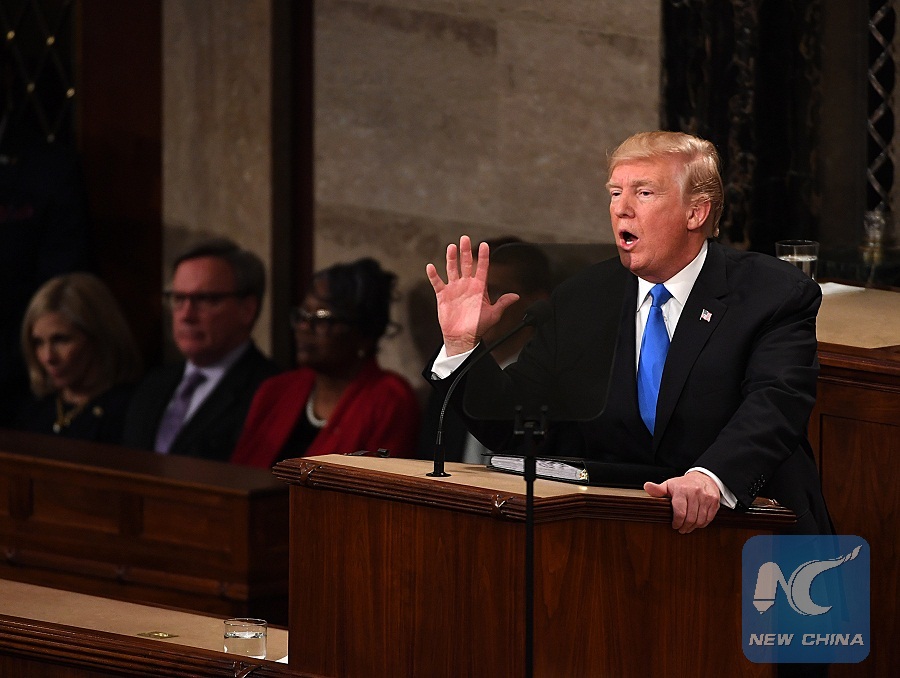
U.S. President Donald Trump delivers his State of the Union address to a joint session of Congress on Capitol Hill in Washington D.C., the United States, Jan. 30, 2018. (Xinhua/Yin Bogu)
BRUSSELS, March 3 (Xinhua) -- U.S. President Donald Trump's planned tariffs on steel and aluminium has sparked anger in the European Union (EU) and the bloc has vowed to take retaliatory measures.
Trump announced on Thursday that the United States is set to impose 25 percent of tariff on steel imports and 10 percent for aluminum.
EU TO REACT FIRMLY
Shortly after Trump's announcement, European Commission President Jean-Claude Juncker responded that the EU would "react firmly and commensurately" to defend its own interests.
"The Commission will bring forward in the next few days a proposal for World Trade Organization-compatible counter measures against the U.S. to re-balance the situation," he said.
"The EU has been a close security ally of the U.S. for decades. We will not sit idly while our industry is hit with unfair measures that put thousands of European jobs at risk. I had the occasion to say that the EU would react adequately and that's what we will do," Juncker added.
European trade commissioner Cecilia Malmstrom said the U.S. measures would have a negative impact on transatlantic relations and on global markets.
U.S.-EU trade relations will be affected by the additional import duties on steel and aluminum coming from the EU, said Fredrik Erixon, the director of the Brussels-based think tank, the European Center for International Political Economy.
"There are always some trade and economic frictions between them, but now that the U.S. says that one of its key allies can't export freely to the U.S. for reasons of national security, it is a slap in the face," Erixon said. "And it adds to brewing disputes they have in competition and tax policy," he added.
The Brussels-based expert said "there isn't for the moment any real cooperation" between the United States and the EU on trade policy, and with Trump's new move, "we are sure to get that relation moving into one of confrontation".
GERMANY: UNACCEPTABLE
German Foreign Minister Sigmar Gabriel called for a strong EU response, saying the move from Washington was "not at all acceptable" and urging Trump to rethink the announcement.
The EU "must respond with determination to punitive U.S. tariffs that threaten thousands of jobs in Europe," Gabriel told a German newspaper.
The EU steel industry groups are also critical.
Trump has chosen "global trade confrontation", said Axel Eggert, director general of the European Steel Association (EUROFER).
"From one day to the next, EU steel exports to the U.S. -- which were at 5 million tonnes in 2017 -- will be severely hit," he said in a statement issued on Friday.
"President Trump has chosen the most disruptive option among those recommended by his secretary of commerce," he added.
The Federation of German Industries (BDI) "supports the EU in its plan to provide an appropriate response", BDI President Dieter Kempf said in a statement on Friday.
He warned a new wave of protectionism would quickly hit Germany as a trading nation.
"The foreclosure policy of the U.S. is a mistake. U.S. President Donald Trump risks global trade conflicts and a spiral of protectionism that will eventually cost American jobs," he added.
Erixon said Trump was "shooting himself in the foot" as the newly-announced tariffs won't help the U.S. economy and may cause bigger job losses in sectors using steel.
He noted that the previous steel tariffs in the U.S. led to a small increase in U.S. steel jobs, but far bigger losses of jobs in sectors using steel.
Steel is an input good, and the cost of construction and car production will go up, making it more expensive to build new infrastructure and be globally competitive in the automobile sector, the economist added.

